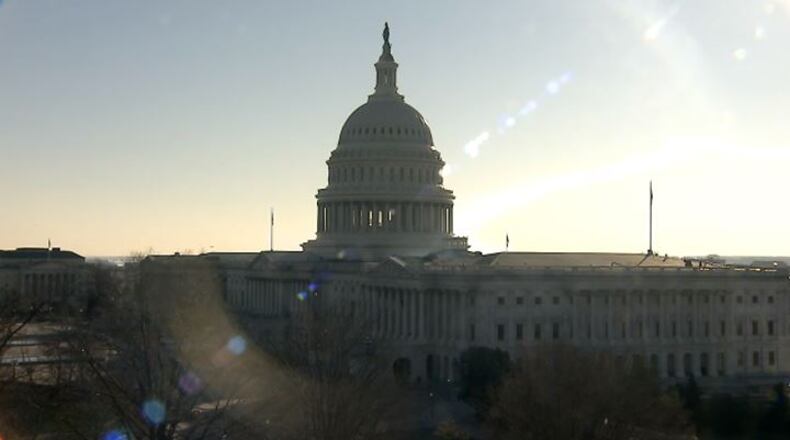As President Donald Trump and Democrats in Congress try to settle their differences over funding for border security and immigration following a bitter 35 day partial government shutdown standoff, there is little moving forward in the Congress on President Trump's legislative agenda, which has essentially been on hold since before the 2018 election.
While the President was able to win approval in 2017 of his signature tax cutting plan, his record on other big items has been more mixed, as the GOP-led Congress was unable to do anything to dramatically change the Obama health law, and did little to win money for Mr. Trump's proposed border wall.
Here are five items where swift action isn't happening for the White House:
1. New NAFTA deal still not before Congress. President Trump keeps talking about how the new trade deal among the U.S., Canada, and Mexico will bring in more money to the U.S. economy - and in a sense - "pay" for a border wall. Except the problem with that logic is simple - you can't have a new trade agreement in place if it's not approved by the Congress. So far, the President has not submitted the language to lawmakers for their approval, as he has threatened to withdraw from the existing NAFTA deal in order to force the hand of Congress. "If he withdraws from NAFTA it would be crushing to U.S. agriculture," said American Farm Bureau chief Zippy Duvall. While the President talks a lot about the new NAFTA - the USMCA - he still hasn't handed it off to lawmakers yet in the House and Senate. It was signed on November 30, 2018.
2. Trump backed plan for new tariff powers falls flat in Congress. With lawmakers in both parties already aggravated by President Trump's trade actions - which have resulted in retaliatory tariffs on farmers, the steel and aluminum industries, and caused collateral economic problems for businesses linked to those - the Trump Administration has asked for new powers in a bill called the "Reciprocal Trade Act." The 17 page plan is fairly simple - if the U.S. finds that other countries are charging higher tariffs than we are on certain products, then the President can quickly move to raise import duties on identical items being imported into the United States. The idea was denounced by the conservative group Club for Growth in recent days, arguing the bill allows the President to "unilaterally increase taxes on Americans who buy goods and services from foreign sources." And the group went after the 18 GOP lawmakers who endorsed it.
3. Only one federal judge confirmed since mid-October. While Republicans have rightly celebrated the strong pace of judicial confirmations by the Senate in 2017 and 2018, that's come to a screeching halt in recent months. Since the Senate left town in October for the November eletions, only one federal judge nominated by President Trump has been confirmed by the U.S. Senate. The end of the 115th Congress meant the President had to start over again with his nominees, further delaying action. The work begins anew on Tuesday, as the Senate Judiciary Committee takes up the nominations of 44 different judges picked by President Trump. The White House had hoped to get more judicial nominees approved at the end of 2018 - but like a bill to fund the government - that didn't happen.
4. Still no signs of a Trump infrastructure bill. The President has been in office for over two years now, and has often talked up his plans for a major infrastructure bill - but nothing to pump new money into road and bridge construction has surfaced from the Trump Administration, other than talk of a public-private investment partnership, which was never acted on by the GOP Congress in 2017 or 2018. There were recent press reports that the President was again talking about unveiling a plan - but that's been the story since he took the oath of office in January of 2017. Democrats have talked about a bipartisan compromise with the President infrastructure, but that still seems to be a long shot, given opposition to the idea of new road and bridge spending among many Republicans in Congress.
5. Senate at a standstill for almost all of January. As GOP leaders spent the last few weeks fending off efforts by Democrats to vote on measures related to the partial government shutdown, nothing else of note was acted upon by Senators. Republicans had hoped to start the month by acting on a foreign policy bill dealing with the Mideast, but Democrats blocked that, arguing that nothing should be addressed on the Senate floor except the shutdown. Finally, last Thursday, the Senate Majority Leader allowed votes related to the shutdown - and now that Mideast policy bill should come up this week. This bill was on the schedule at the start of this year, but hasn't seen the light of day because of the shutdown. It's a reminder that many lawmakers feel shutdowns aren't the best way to exert legislative leverage on Capitol Hill.
Will the showdown over money for border security be different? Lawmakers - and the White House - face a February 15 funding deadline for an agreemnet, or there could be another partial government shutdown.
About the Author
The Latest
Featured



